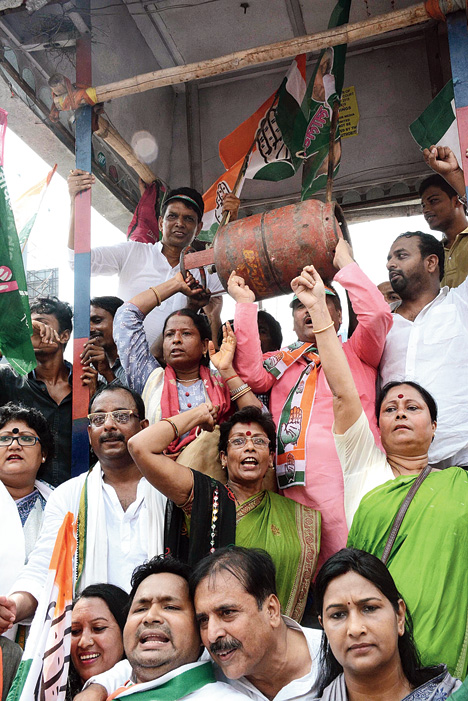
Picture by Nagendra Kumar Singh
Patna: Monday's Bharat Bandh against runaway fuel prices has re-ignited the debate on whether the states should reduce their share of the tax to provide relief to the common man when the Centre is clearly unwilling, but Bihar faces some hurdles on that front.
When in Opposition, senior BJP leader Sushil Kumar Modi would demand a reduction in VAT (value added tax) on fuel whenever prices became political fodder. Now, as the man who looks after the finances of Bihar, he is silent.
"There is very little scope for cuts in VAT in petrol and diesel," said economist P.P. Ghosh. "It (VAT) contributes almost 30 per cent of the revenue generated from commercial taxes. Even if the state decides to reduce the taxes it will be minimum. In Bihar's finance even Rs 500 crore is a big amount."
Bihar's total internal revenue in the financial year 2016-17 was Rs 23,742 crore. Commercial taxes (read VAT) accounted for Rs 18,751 crore of that amount and Rs 5,118 crore was from petroleum products.
"Even if the Union government reduces Re 1 (per litre) it will lose around Rs 10,000 crore - hitting welfare schemes and Bihar will also lose revenue in the process," pointed out an official of the state finance department.
Bihar levies 26 per cent VAT on petrol and 19 per cent on diesel - more than Jharkhand where fuel is available at around Rs 5 per litre less.
"But Jharkhand has many other revenue sources like royalty from ore and coal and industries. Bihar has nothing to fall back on," said the finance department official.
The move by Rajasthan to reduce VAT had generated hope that Bihar would do the same. But BJP leaders here point out that the western state is poll-bound and the government there is compelled to take the step. "But there is no compulsion here as elections are still far away. By that time we think prices of fuel will come down," a senior Bihar BJP leader said under cover of anonymity.
Economists are also pointing fingers at prohibition to show how Bihar has little elbow room to cut state taxes.
"Bihar lost about Rs 5,000 crore in excise taxes apart from other losses like in the hotel industry. Had the dry law not been enforced, Bihar would have generated more revenue and the government may have been able to give relief in taxes on fuel," said an economist who requested anonymity. This economist also pointed out that Bihar has had to hike taxes on other items to meet the loss it incurred due to prohibition. With taxes already raised and industry showing no signs of growth, the Bihar government can do little but hope that the rupee becomes stronger and the cost of fuel reduces.











